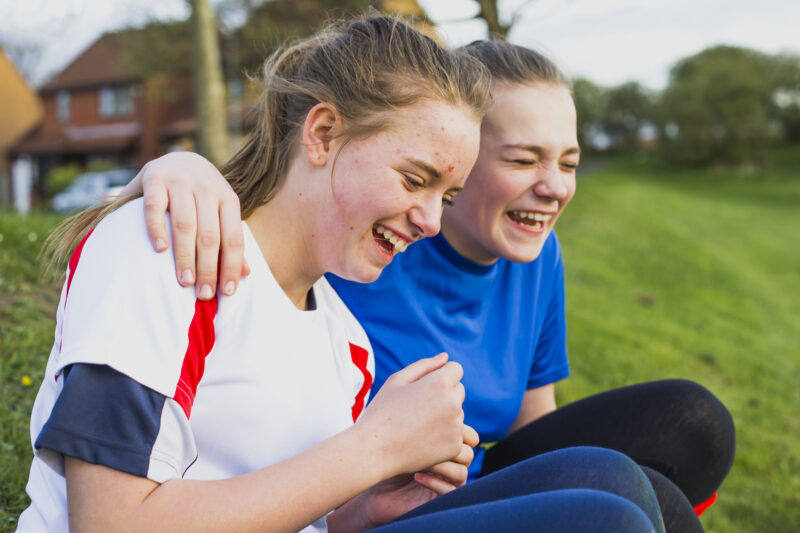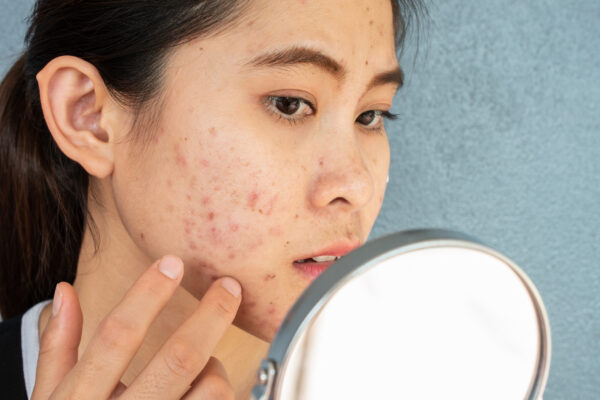
Just like school, breakups and summer jobs are part of just about every teenager’s life, so, too, is acne. It’s estimated 85 percent of preteens and teens have acne, according to the American Academy of Dermatology Association.
Yet, that doesn’t make it any easier when your teens look in the mirror and spot a big, red pimple on their chins.
“We know acne affects teens pretty profoundly because they are hyper-focused on appearance,” said Stephen Sondike, MD, director of the Adolescent Medicine Center at Akron Children’s. “It can affect a teen’s mood, self-esteem and ability to socialize, and even lead to depression or suicidal thoughts in severe cases.”
Acne is a skin condition that causes whiteheads, blackheads or red pimples to appear across the face, neck, shoulders, upper back and chest. When the skin’s oil glands produce too much oil, a teen’s pores can get clogged with oil, dead skin cells and bacteria. This can lead to inflammation and an infection in the skin surrounding the pore.
How to manage acne at home
Acne is prevalent in teens because of the hormone changes that come with puberty. Hormones can stimulate the oil glands and they can become overactive.
Unfortunately, there’s no sure way to prevent acne. If your teen is struggling with mild acne, try these tips to reduce its severity:
- Wash away surface oil and dead skin that can clog pores once or twice a day with warm water and a mild cleanser. Wash after exercising because sweat can clog pores, too.
- Use your hands, instead of scrubbing with a harsh washcloth. Scrubbing can irritate the skin and make acne worse.
- Products with benzoyl peroxide or salicylic acid are usually helpful for treating acne.
- Use oil-free makeup, sunscreen and moisturizer on your face.
- Keep long hair, hairspray and styling gel away from your face and wash your hair regularly to reduce oil and bacteria.
- Avoid baseball caps and other hats, which can cause acne along the hairline.
- Try not to touch your face. Hands have dirt and bacteria that can make acne worse.
Most importantly, don’t pick, squeeze or pop pimples!
“Every time you pick, you’re introducing more bacteria into the lesion, causing even more inflammation and redness,” warned Dr. Sondike. “Plus, if you break the skin and pus leaks, it can infect other pores nearby. Squeezing also can actually push infected material and pus deeper into the skin, which can lead to scarring.”
When to see a doctor about my teen’s acne

If acne has spread to other body parts, is leaving behind pits or scars, or is causing mood issues, it’s time to see a doctor about your teen’s acne.
Sometimes, home remedies to reduce acne don’t help, especially in moderate to severe cases. If your teen has acne that has spread to multiple areas on the body, is leaving behind pits or scars, or is causing mood or self-esteem issues, it’s time to see a doctor.
Adolescent medicine specialists are a good place to start because they can help treat the skin problem, as well as social and other mental health problems acne may cause. A provider can prescribe stronger creams that prevent pimples from forming or antibiotics that decrease swelling and kill bacteria that cause them.
For young women, birth control can help control breakouts, especially for girls who have a handle on their acne, but tend to break out a few days before their periods.
For severe cases that have failed other treatments, your doctor may prescribe Accutane. It’s a potent drug that is very effective at treating nearly all types of breakouts. It can have strong side effects, Dr. Sondike warned, so it requires close monitoring and monthly visits in the office.
“Usually, acne can appear to get worse before it gets better with treatment,” he said. “So, it’s important to have patience when starting treatment. Remind your teens in the meantime that they are not alone. Just about every teen — and adult — will develop a pimple at one time or another in their life!”
To schedule an appointment in Akron Children’s Adolescent Medicine Center, call 330-543-8538. Telehealth appointments are available.










